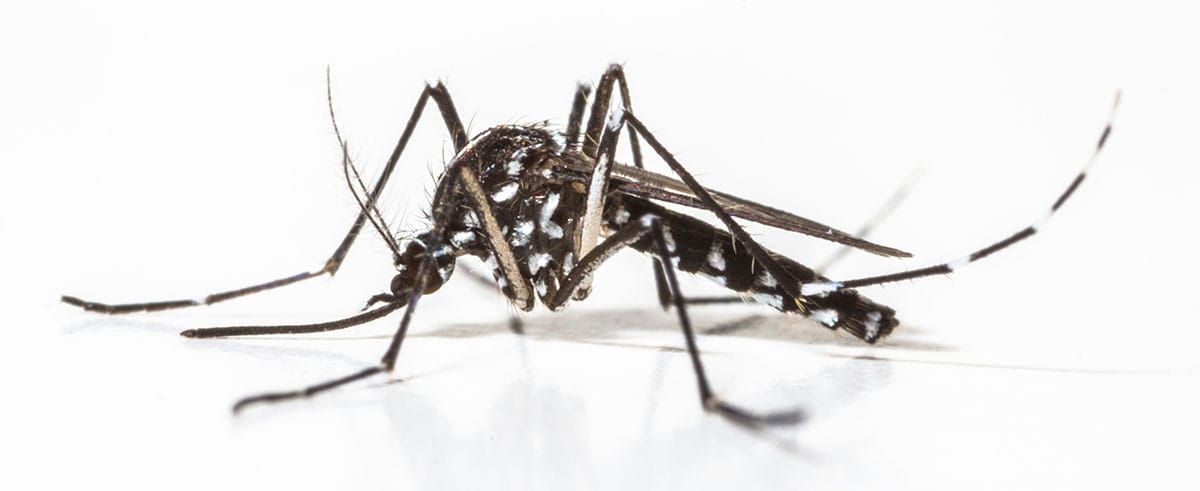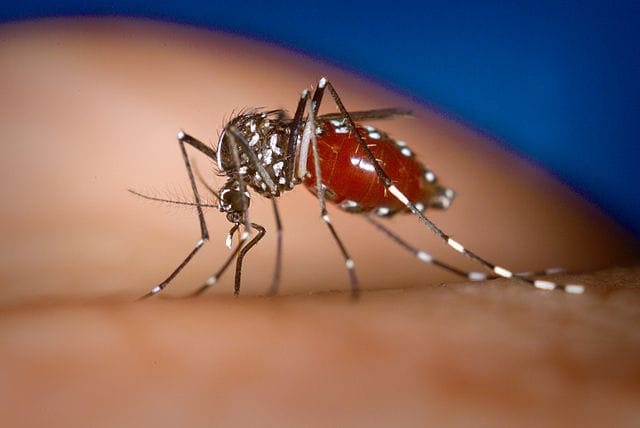The Tiger mosquito, (moustique tigre) normally native to Southeast Asia, arrived in North Catalonia several years ago, and could even be migrating north as winters become warmer and wetter, so Britains beware! It might be possible for them to survive the cold winters by settling in water pipes, vases and even greenhouses.

These unpleasant little devils fly and attack during the day as well as night, their bites are more painful than the common or garden mozzie, and their stinger is able to pierce clothing!
They can carry dengue and chikungunya viruses, both of which cause high fevers, but mostly, the bite is just unpleasant. Itchy and sometimes painful, similar to a common mozzie bite.
To avoid being stung, you could surround yourself with flatworms, swimming beetles and spiders, which are their natural enemies! Not the choice for most P-O dwellers however! An easier option is to avoid leaving pots of stagnant water or old tyres lying around as these are fave reproduction sites.

The mosquito (meaning ‘little fly’ in Spanish) has been around for more than 30 million years, giving it plenty of time to hone its ‘biting’ skills to a fine point.)
These little blighters track their ‘prey’ via chemical sensors. They are able to sense lactic acid, and carbon dioxide, given off by the normal breathing process. They can also detect heat and movement!
Only the female mosquito bites. She is attracted by heat (infra- red light), light, perspiration, body odour, lactic acid and carbon dioxide. When she lands on your skin, she sticks in her “proboscis” (from Greek pro “before” and boskein “to feed”), a very sharp, thin, organ which you will often not even feel. Her saliva contains proteins (anticoagulants) which prevent your blood from clotting.

After she has bitten you, some saliva remains in the wound, causing itching and provoking a response from your immune system – the dreaded mozzie red lump! The itching continues until your immune cells break down the saliva proteins.
It is believed that diet plays an important role in making us more or less attractive to mozzies, along with perfumes, soap residues, make-up, and deodorants. Some claim that women are more likely to be “bitten” than men because mosquitoes are repelled by the strong odour of human sweat. (Sorry guys, you do tend to be the stinkier sex) others that mosquitoes prefer certain blood groups, or that drinking alcohol causes your skin to give off a chemical that attracts mosquitoes. Even the medical treatment you may be taking can play a role in your “mozzie attractiveness”.
Don’t invite Monsieur Mozzie to dine chez vous
- Use an unscented antiperspirant to keep your sweat levels down
- Wear light clothing. Mosquitoes are more apt to bite people wearing dark colors.
- Use a DEET-based insect repellent during the dawn and dusk periods, when mosquitoes are most active. (DEET-based sprays should be used very cautiously with children).
- Avoid standing near water which attracts mosquitoes.
- Avoid wearing perfumes and body lotions.
- Citronella candles can help keep mosquitoes out of an area, but don’t rely on them, particularly in the P-O as wind can dissipate the smoke and smell quickly.
Reader’s Tips
- Drink or bathe in gin and tonic – heavy on the tonic – as the quinine in tonic keeps them at bay
- Take brewers yeast tablets or eat plenty of marmite as the yeast comes out of your pores and repels the mozzies.
- Mash cooked garlic into cider vinegar, leave it overnight, then rub it into your feet and legs between your toes, in your armpits and groin. The mozzies won’t come near you. Nor will anyone else!
- There is a stinky kind of cheese called Limburger that smells (to a mozzie) like a person so if left out in a bedroom confuses the hell out of them.
- Cut a lemon in half and press dried cloves into the cut half and leave to dry out. keeps flies rather than mozzies away and makes house smell gorgeous.
- Apply Blistex lip balm to the bite
- Pure lavender essential oil works wonders too. A natural healing agent and calms a bite instantly and also a repellent
- Using the back of a hot spoon on the bite will relieve the itching for most people.
- Aloe Vera gel kept in the fridge works wonders!
- Start taking vitamin B6. After a week or so, it gets into your system; they don’t seem to like it
- When we lived in the Caribbean, we would eat one tablespoon of molasse each morning. It takes about 3 weeks to kick in but it worked
- Just rub saliva on them (the bites, not the mosquitos!)
Create a mosquito trap by placing a cow in your garden!!

Cows give off the chemical signature that mosquitoes crave. They are warm and release certain plant chemicals (from eating grass) and produce carbon dioxide with every breath. Yes, I know. VERY SILLY and not the most practical option but apparently it does work!!!
| A P-O mosquito called Bert Honed his sting til it stood up quite pert Then he dived for the kill and drunk blood to his fill After rolling with glee in the dirt! |



I find that using plug in déterrants at night as well as keeping shutters closed keeps them at bay snd prevents any nocturnal mosquito manoeuvres
Deet spray is good for deterring the blighters if you are out and about during the day